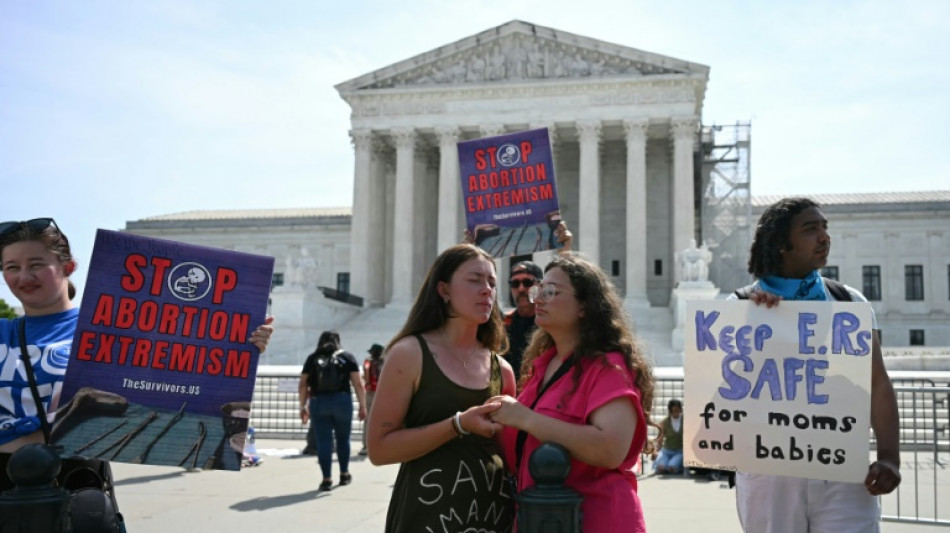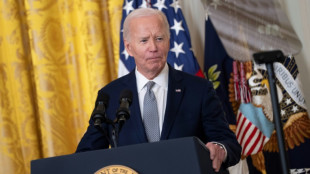

In narrow ruling, US Supreme Court allows emergency abortions in Idaho
The US Supreme Court on Thursday cleared the way for women experiencing medical emergencies to obtain abortions in Idaho, but the ruling's narrow scope meant it was a muted victory for reproductive rights activists.
The decision comes two years after the conservative-majority bench dismantled the nationwide right to terminate a pregnancy, making it a pivotal issue in November's presidential election.
"The stakes could not be higher and the contrast could not be clearer," said President Joe Biden, who is neck and neck with Donald Trump in the tight race for the White House.
"My Administration is committed to defending reproductive freedom and maintains our long-standing position that women have the right to access the emergency medical care they need."
In a brief, unsigned order, the court reinstated a lower court's injunction that ensured hospitals could terminate pregnancies to protect a mother's health, dismissing appeals by the western state's leaders.
But the new ruling, which was mistakenly uploaded on Wednesday and first reported by Bloomberg, does not tackle the substance of the case -- namely, whether Idaho's near-total ban on abortion conflicts with a federal law requiring hospitals to stabilize patients needing emergency care.
Rather, the Supreme Court said that the appeals were dismissed because they were "improvidently granted," meaning they should not have taken up the case in the first place, and it can now run its course in lower courts.
A decision on the merits could have had potentially sweeping national consequences.
Three conservative judges -- Chief Justice John Roberts, Brett Kavanaugh and Amy Coney Barrett -- joined with the liberal wing in dropping the case.
Conservative Justices Clarence Thomas, Samuel Alito and Neil Gorsuch dissented.
After the fall of Roe v. Wade in June 2022, Idaho enacted one of the most stringent anti-abortion laws in the United States.
It allows the procedure only in cases of rape, incest and "when necessary to prevent the death of the pregnant woman," and provides for penalties of up to five years in jail for a doctor who carries out an abortion.
- 'Kicked the can down the road' -
Biden's administration then sued the state, arguing its Defense of Life Act violated a federal law requiring hospitals that receive government Medicare funding to provide emergency room care, including abortion, in situations that are serious but not necessarily life-threatening.
Concurring with the majority, Justice Elena Kagan said the decision "will prevent Idaho from enforcing its abortion ban when the termination of a pregnancy is needed to prevent serious harms to a woman's health."
Justice Ketanji Brown Jackson partly concurred, but expressed regret that the court had chosen not to hear the case's merits.
"I dissent in part because, in my view, the Court is wrong to dismiss these cases as improvidently granted," she wrote, adding the "procedural mechanism" should not be "turned into a tool for the Court to use to avoid issues that it does not wish to decide."
This view was echoed by the Center for Reproductive Rights, which said that even with the injunction in place, hospitals across states that ban or severely curtail abortion have shown they are unwilling to provide emergency abortions, out of fear of severe criminal penalties.
"We are relieved for the moment, but hardly celebrating," said Nancy Northup, president and CEO of the Center for Reproductive Rights.
"The Court kicked the can down the road on whether states with abortion bans can override the federal law requirement that hospitals must provide abortion care to patients in the throes of life-threatening pregnancy complications."
Alito, one of the most conservative justices, meanwhile said the court's decision to distance itself from a case it initially chose to take was "baffling" and a sign it "simply lost the will to decide the easy but emotional and highly politicized question that the case presents."
(C.Young--TAG)




